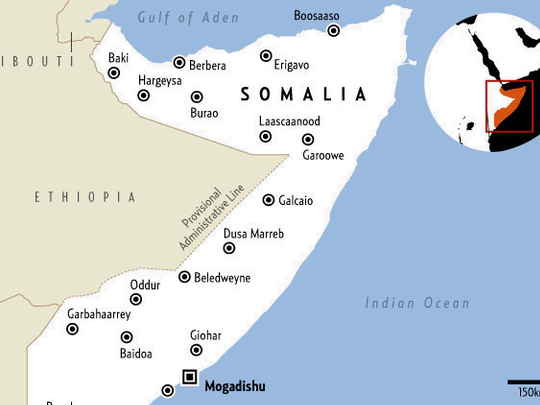
Dubai: The fate of 16 crew aboard a hijacked UAE-owned oil tanker is unclear as the pirates are reported to be taking the oil-laden vessel toward the northern coast of Somalia.
Flying UAE colours, the tanker MV Jubaa XX was hijacked on Saturday morning by Somali pirates in the northern Indian Ocean, confirm authorities with the European Union Naval Force Somalia (EUNAVFOR).
The attack is the latest in a long string of acts of piracy on commercial shipping lanes in the region in recent years that have targeted particularly valuable oil tankers given their cargoes are worth millions of dollars.
Pirates descended on the tanker midway between Somalia's northeasternmost tip, better known as the Horn of Africa, and the coast of Yemen.
The 4,831-tonne vessel is much smaller than the giant tankers that haul millions of barrels of crude oil around the world.
The crew comprises one Sri Lankan, five Indians, three Bangladeshis, one Sudanese, one Myanmarese, one Kenyan and four Somalis, naval officials said.
Lucrative gains
According to a statement issued by Commander Harrie Harrison, Royal Navy spokesperson for EUNAVFOR, nine pirates somehow managed to overpower the tanker's crew.
"Late on the morning of July 16, it was reported by the owners that the MV Jubaa XX, a laden tanker, had been pirated in the northern Indian Ocean, on her regular route from the UAE to the port of Berbera, Somalia," said the naval force statement.
"On the morning of July 17, the vessel was located by a Maritime Patrol aircraft 100 nautical miles north-west of Socotra Island, heading to the northern Somali coast. Little information is available at present but it is reported that nine suspected Somali pirates are on board."
The vessel, the naval force said, is a "UAE owned and flagged oil tanker, deadweight of 4,831 tonnes, with a crew of 16...There is no information on the condition of the crew and the vessel was not registered with [Maritime Security Centre - Horn of Africa] at the time of the pirating. EUNAVFOR continues to monitor the situation."
The naval force is monitoring the ship's movements via marine aircraft.
European Union Naval Force Somalia — Operation Atalanta is a military operation tasked to keep blue water areas around Somalia and the east coast of Africa free from pirate attacks and conducts operations under the authority of United Nations Security Council resolutions.
The naval force mission "has been extended until December 2012," officials said.
Military action
Other military vessels operating in the region in recent years from Canada and the US have also confronted pirates on the high seas, leading to the arrest and some deterrence to pirates who are lured by the promise of lucrative gains.
The spiralling incidence of piracy on Somalia's coast is being fuelled by drought, poverty and the lack of a recognised government in the destitute African nation.
The European Union Naval Force Somalia, meanwhile said it is working to protect ships carrying goods for the World Food Programme, humanitarian aid and African Union Mission in Somalia (AMISOM).
"Contributions from third countries such as Norway are participating as well. Also, a number of Cypriot, Irish, Maltese and Finnish military personnel supplement the team at the Northwood Operation headquarters," the naval force said on its website.
Losses of $16b a year
Piracy remains a significant issue (with estimated worldwide losses of $13-$16 billion per year), particularly in the waters between the Red Sea and Indian Ocean, off the Somali coast, and also in the Strait of Malacca and Singapore, which are used by over 50,000 commercial ships annually.
A recent surge in piracy off the Somali coast spurred a multi-national effort led by the United States to patrol the waters near the Horn of Africa.
Modern pirates favour small boats and take advantage of the small number of crew on modern cargo vessels. They also use large vessels to supply the smaller attack/boarding vessels.
Modern pirates can be successful because a large amount of international commerce is conducted via shipping. Major shipping routes take cargo ships through narrow bodies of water (such as the Gulf of Aden and the Strait of Malacca) making them vulnerable to be overtaken and boarded by small motorboats.
Other active areas include the South China Sea and the Niger Delta. As usage increases, many of these ships have to lower cruising speeds to allow for navigation and traffic control, making them prime targets for piracy.











